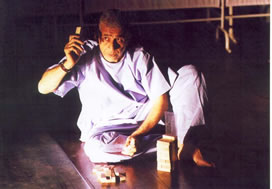Naseer as ‘The Prophet’ (Manohar Khushalani)
– Maohar Khushalani
The location: Tata Experimental Theatre at Nariman Point in Mumbai. On stage two hospital beds at right angles to each other and a screen. The audience trickles in at first but gradually the seats get filled on all three sides even the balcony that looks like a cat walk in a factory has a few odd audience members. Rishab Thaker starts the first few lines from Khalil Gibrans Poetic composition : The Prophet. After a mild pause in comes the legendry actor Naseeruddin Shah spewing poetry. One wondered how the audience can be held by sheer poetry: “When love beckons to you follow him, Though his ways are hard and steep. And when his wings enfold you yield to him, Though the sword hidden among his pinions may wound you. when he speaks to you believe in him, Though his voice may shatter your dreams as the north wind lays waste the garden.” Such profound poetry was delivered with such comfort and ease that the meaning of the words was apparent due to the style of delivery.
Gibran Khalil Gibran born on January 6, 1883, to the Maronite family of Gibran in Bsharri, a mountainous area in Northern Lebanon. He was barely 12 when the Gibrans embarked on a voyage to the American shores of New York. The Gibrans settled in Boston’s South End. In the school, a registration mistake altered his name forever by shortening it to Kahlil Gibran. Gibran was pulled to the cultural side of Boston, which exposed him to theatre, Opera and Art Galleries. Gibran’s works were especially popular in America in the 1960s. His early works were in Arabic, however, from 1918 onwards he wrote mainly in English. Among his best-known works isThe Prophet, a book of 26 poetic essays, which has been translated into over 20 languages. The Prophet, who has lived in a foreign city 12 years( the same number of years he lived in Lebanon) is about to board a ship that will take him back to his home. He is accosted by some people, who learn from him about the mysteries of life:
“Almustafa, the chosen and the beloved, who was a dawn onto his own day, had waited twelve years in the city of Orphalese for his ship that was to return and bear him back to the isle of his birth. … he climbed the hill without the city walls and looked seaward; and he beheld the ship coming with the mist. Then the gates of his heart were flung open, and his joy flew far over the sea. And he closed his eyes and prayed in the silences of his soul. But as he descended the hill, a sadness came upon him, and he thought in his heart: How shall I go in peace and without sorrow? Nay, not without a wound in the spirit shall I leave this city.”
And what were Gibran’s views about various issues? There is not much space but just a few lines about marriage: “You were born together, and together you shall be forevermore. … But let there be spaces in your togetherness, And let the winds of the heavens dance between you. Love one another but make not a bond of love:Let it rather be a moving sea between the shores of your souls. Fill each other’s cup but drink not from one cup. Give one another of your bread but eat not from the same loaf. Sing and dance together and be joyous, but let each one of you be alone, Even as the strings of a lute are alone though they quiver with the same music.” How insightful and relevant to this day.
